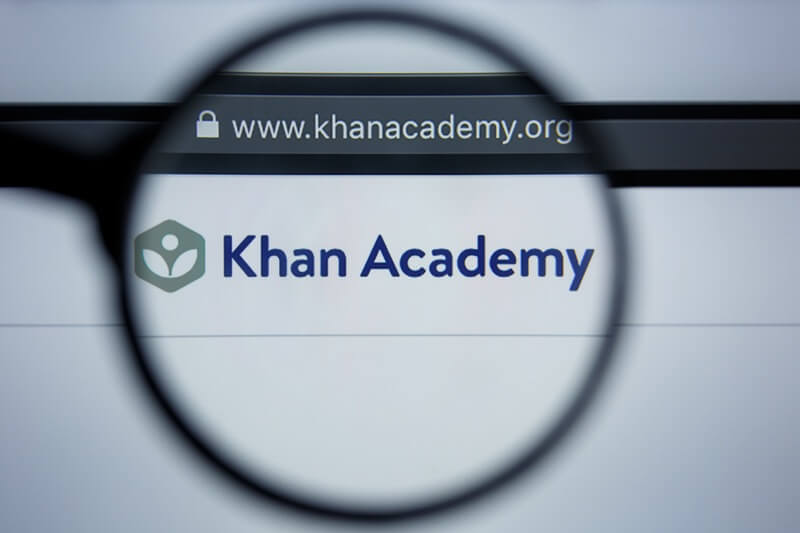
Using Khan Academy for MCAT prep is something that many students are curious about. Due to its accessibility, cost, and the size of its library, that interest makes a lot of sense.
This Khan Academy MCAT prep review goes over everything you need to know about this study resource. What we like, what we dislike, and whether we think you should use it or not.
Table of Contents
About Khan Academy MCAT Test Prep
Khan Academy is a unique educational platform that most people know for helping school-age students learn a wide range of topics. It first launched in 2008 as an alternative to traditional tutoring. It provides a personalized learning experience through interactive content, videos, and short lessons.
At first, Khan Academy catered to young kids and teenagers. It quickly became a go-to for young students studying for big exams and important standardized tests like the SAT and ACT. Before long, the platform expanded to offer resources for college-aged students and would-be medical students.
The MCAT prep course at Khan Academy has the distinction of being the first to be approved by the Association of American Medical Colleges (AAMC) which is the organization that administers the MCAT.
Khan Academy is a premier partner that works closely with the AAMC to develop relevant and valuable content for your preparation endeavors. The result is an intuitive course that’s fun and easy to use.
It’s available in a myriad of languages and is accessible on many devices.
The best part of the Khan Academy MCAT prep course? It doesn’t cost a dime to use. The MCAT resources are entirely free! Unlike other prep courses, Khan Academy doesn’t charge a fee to access. As you know, the price of the MCAT can get quite high when you factor in study tools. That makes free resources a welcome addition to your plan.
The only requirement is that you create an account to save your progress. Because of its non-profit nature, Khan Academy is favored by medical school students the world over.
While it certainly has a lot to offer, Khan Academy is a far different experience than other paid prep courses. Whether or not it can serve you depends on your preparation needs.
Curriculum & Coursework
The MCAT course material at Khan Academy covers a wide range of topics. The curriculum focuses more on content review than anything else. That means that it’s usually not as effective if you have some knowledge gaps to fill.
The lessons do a fine job of jogging your memory and refreshing what you already know. However, it’s not an ideal resource if you need to be taught a lot of brand-new concepts. If you’re unfamiliar with the topics covered, you might find the lessons too brief and unhelpful for your needs.
Khan Academy breaks up the curriculum into several sections, which you can jump through at your leisure. There’s no set path to follow, so you’re free to work on the units you need help with most.
As you would expect from any MCAT preparation platform, Khan Academy covers biology, physical processes, chemical processes, behavior, organ systems, and more. The course even has dedicated sections for non-science subjects like social inequality and culture.
Thanks to Khan Academy’s partnership with the AAMC, it truly does cover most of the topics you’ll encounter on the MCAT.
The lessons are concise and delivered through video format. The videos are easy to follow and come with full voice-over audio. The audio feels natural as if you’re listening to a lecturer go over topics in a classroom.
To further solidify that classroom feel, each Khan Academy video has a style that’s modeled off of a blackboard. Colorful illustrations appear as the narrator discusses core concepts you need to know.
Overall, the curriculum is decent. It’s not the most comprehensive, but it’s delivered in a way that will benefit most test-takers in one form or another.
Another unique thing about Khan Academy that’s worth mentioning is the gamification. When you sign up for an account, you have the chance to create an avatar that will accompany you through your studies.
As you progress and complete more lessons, you’ll unlock accessories to dress up your little digital creature. Badges and achievements exist, too. While the gamification elements don’t impact the coursework in any way, it’s a nice motivator for those who need an extra push.
Practice Tests
Let’s talk about practice tests. A big part of preparing for the MCAT is taking exams that follow the same format as the real test. That way, you get comfortable with answering questions quickly and efficiently.
Khan Academy has a modest practice test system. However, it’s not like a full sit-down test. Every section that you complete comes with several questions that you can answer.
It’s machine-graded, so there’s not a ton of feedback. Khan Academy will explain why you got a question wrong, but it doesn’t address any knowledge gaps or difficulties you might be experiencing.
With all of the sections included, there are a decent amount of practice questions to complete. Khan Academy also has separate units to reflect each section of the MCAT test. They’re entirely different entities than the topic-based units for covering core concepts.
When you dive into one of these four sections, you don’t have any lessons to go through. The only exception is the “Critical Analysis and Reasoning Skills” section (more on that in a second).
For all of the other sections, your only option is to run through the practice passages. It’s a great way to prepare for each unit of the MCAT individually.
CARS is arguably one of the best sections in the Khan Academy MCAT library. A few lessons are available to help you get familiar with what the AAMC expects of you for this exam phase. Some helpful videos also prepare you to find reasoning within and beyond the test, which can be very helpful.
All in all, the CARS section seems to be the most in-depth. It has far more questions than the actual MCAT, allowing you to immerse yourself in what many test-takers consider to be the most challenging part of the exam.
How The Content Is Delivered
Khan Academy has a versatile content delivery system. Once you make an account, you can log onto the website or download the mobile app.
The mobile app is available for both Android and iOS devices. It’s just as intuitive as the website platform. There’s also a feature to download lesson videos to access them offline, which is a nice perk.
All of your progress synchronizes between the app and website platform. You can switch between platforms and pick up where you left off without any issues.
Pros
There are many things that Khan Academy does well.
First and foremost, it’s free and accessible on most devices. The fact that it costs zero dollars to utilize is one of the reasons why so many students turn to Khan Academy for preparation.
It also covers most topics you’ll encounter on the MCAT. Khan Academy excels in a couple of critical subjects.
The platform is one of the best for psychology and social sciences. The MCAT resources don’t gloss over those topics, which sometimes occurs with other test prep courses and resources.
Khan Academy is also a strong resource for CARS preparation. Not only do you get an extensive collection of practice passages, but the platform includes several lessons that focus entirely on reasoning and foundations of comprehension.
The CARS section of the MCAT is notoriously tricky, so students have a lot to gain from this aspect of Khan Academy (especially when you factor in the price).
Finally, the entire course structure is approachable and enjoyable to complete. While it has a no-frills interface, the gamification elements can help some test-takers find the motivation to get through each lesson. When you pair that with the integrated rewards system, preparing for the MCAT can feel more like a game than busywork.
Cons
Despite all of the good that Khan Academy does, there are some notable drawbacks. The first area of weakness is the course structure and the practice questions.
Khan Academy does not require you to follow any type of structured lesson plan. While that might benefit those looking to cherry-pick the sections they want to work on, the lack of structure can ultimately hinder you.
To make the most out of the MCAT preparation material, you have to create your own plan and stick to it. It requires a lot of self-accountability, which could be problematic for some.
The sporadic nature of the Khan Academy MCAT resource is most apparent when trying to get through the practice questions. Most full-fledged prep courses offer detailed practice tests that simulate the MCAT experience. It’s one of the most critical parts of your preparation journey.
However, the practice questions at Khan Academy are nothing more than a multiple-choice screen. There’s no time limit to teach you how to answer questions efficiently. The hint system is a nice touch, but it only makes getting through those problems even more relaxed.
Preparing for the MCAT is about getting used to the pressure and stress. With Khan Academy, there’s no way to do that!
Our Opinion
So, is Khan Academy good for the MCAT?
All in all, we think it’s a great platform to get free content and supplementary resources if you want to get a good MCAT score.
However, it shouldn’t be your only study tool for MCAT prep. The lessons can be helpful, but they’re not nearly as in-depth as you’ll probably need them to be. The lack of features can also hinder your progress rather than push you forward.
Students typically benefit more from structured prep courses that offer hands-on learning and personalized experiences. When studying for the MCAT you should cater to your specific needs and change as you progress through the program. Unfortunately, Khan Academy has no way to gauge your progress, adjust to your strengths and weaknesses, or create custom lessons.
Khan Academy is good for free content, but it lacks the features you need most to make the most out of your preparation window. The MCAT is hard, and you need to take it as seriously as possible.
We hope you found this review helpful. If you have any questions, feel free to ask us!




